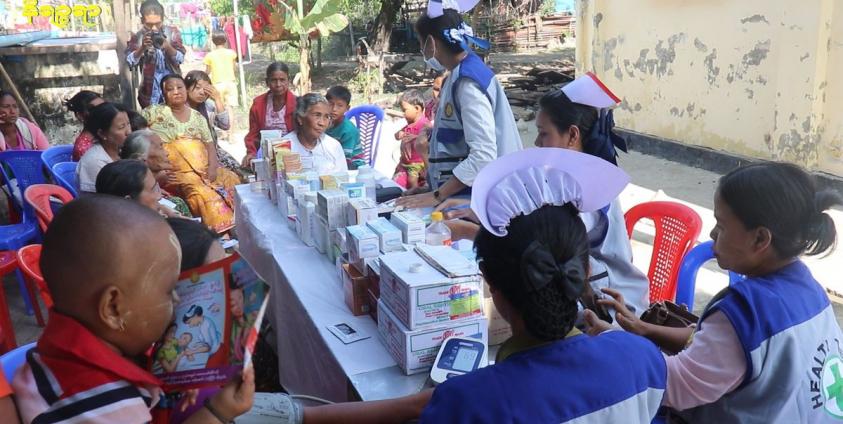According to the cyclone-affected locals in Rakhine State, there is still a dire lack of adequate healthcare, and individuals with poor health are experiencing significant challenges and hardships.
The affected locals emphasized that the weakness of healthcare services extends not only to rural areas but also to towns in Rakhine State.
An IDP residing in Kawi Yadanar IDP camp in Kyauktaw Township expressed, "Following the cyclone, representatives from the health department visited our camp once. However, since then, they have not returned at all. With the flu season upon us, some individuals are falling ill, but without proper healthcare available, they are forced to seek treatment at clinics, incurring substantial expenses. People here do not have sufficient funds, but their well-being is paramount, so they resort to mortgaging or selling their possessions in order to afford medical care."
Following the cyclone, the people of Rakhine have been afflicted by diarrheal diseases resulting from contaminated drinking water, as well as colds and illnesses arising from inadequate shelter. However, the local health department has not visited the affected areas or provided the necessary medical treatment.
In the cyclone-affected villages of Pauktaw Township, residents are facing multiple challenges. The cyclone caused saltwater to enter the lakes, resulting in contaminated drinking water and diarrheal diseases. Moreover, the lack of repaired dormitories leaves them vulnerable to sickness during rainy conditions.
Ma Myint San from Thea Khone Village, Pauktaw Township, whose village was entirely devastated by the cyclone, expressed the community's strong desire for health centers to be established in the villages to provide the much-needed healthcare services.
"I have also fallen ill with a cold due to inadequate shelter. Despite receiving tarpaulins from donors, rain and wind still manage to seep through. Not only does rain leak from the top, but it also enters from the sides. The health department visited our village only twice after the storm. Since the water is not clean, our village has been grappling with issues like diarrhea and skin diseases. With the recent storm, the need for healthcare has become even more critical. However, it is inconvenient to travel to the town for clinic visits during the rainy season, compounded by financial difficulties. If possible, I would like to request the establishment of a small clinic in our village to provide essential healthcare services," she said.
Since the cyclone struck, the villagers of Thae Khone have not received any assistance from the Military Council. They have been relying on donations from civil society organizations to sustain their livelihoods.
Ma Myint San further noted that no donors have arrived in the area since the reports emerged about the Military Council's ban on aid.
Cyclone Mocha resulted in the destruction of 216,681 homes in Rakhine state, impacting over a million residents. However, the cyclone victims have been unable to rebuild their damaged homes, leading to challenging circumstances. Their livelihoods have been strained, making it difficult for them to afford essential items such as medicine or to seek medical attention at hospitals and clinics.
"I used to witness the health department visiting our village once a month in the past. However, after the cyclone, their visits ceased entirely. As far as I am aware, the health department is planning to establish a day clinic on June 24-25. Our area is not easily accessible by road, making transportation challenging. Moreover, the ongoing situation has imposed significant hardships on everyone. Financially, people are not at ease either. Some patients even have to rely on donations within the village to cover their medical expenses," shared a resident from Taw Phyar Chaung village, Ponnagyun township.
When contacted by phone to inquire about the availability of sufficient healthcare in cyclone-prone areas of Rakhine, Dr. Zaw Zaw Aung, deputy director of the Rakhine State Department of Public Health, abruptly ended the call, stating that he was in a meeting.
Likewise, when contacted again, U Hla Thein, spokesperson of the Rakhine State Military Council, did not answer the phone call.
Despite international countries, including India and Thailand, donating medical supplies, food, and shelter for the cyclone victims in Rakhine through the Military Council, the donated items have not yet reached the affected individuals.
According to State Military Council spokesman U Hla Thein's social media announcement on June 15, out of the 752 hospitals and clinics damaged by Cyclone Mocha in Rakhine on May 14, a total of 750 have been reopened. However, despite these efforts, the healthcare services for the people remain inadequate and weak.







